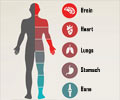- Sensory overload: A concept analysis - (https://pubmed.ncbi.nlm.nih.gov/28185369/)
About
Overstimulation, also known as sensory overload, is more widespread in today's fast-paced, technologically advanced society. With so much information to intake and process, our senses are frequently overwhelmed, resulting in tiredness and frustration. Overstimulation has become so common that people are sometimes unable to distinguish it from normal sloth, exhaustion, and mood swings. However, it is critical to identify the condition and take the required steps to manage and control it.
Did You Know?
Excessive screen time can lead to sensory fatigue, making it harder for your brain to process information. Time to take a break! #overstimulation #mentalwellness #digitaldetox #medindia
What is Over Stimulation?
Overstimulation is difficult to identify and describe since it can induce a wide range of symptoms that differ from person to person. Furthermore, what many people feel as a result of being overstimulated can be misinterpreted as other bodily discomfort and emotional responses.
A person gets overstimulated when they are exposed to more stimuli than they can handle or comprehend, such as noise, illumination, movement, or emotional distress. Stimuli are external or internal variables that elicit a response in a person's sensory system or brain.
Overloading the brain and neurological system can cause an increase in arousal levels. Being "too full" of stimuli indicates that the body and mind are having difficulty keeping up. The sympathetic nervous system is triggered when the body is overstimulated and enters a fight-or-flight (or hyperarousal) or freeze state. As the body seeks to comprehend a steady influx of information, it may experience a range of emotional and physical reactions(1✔ ✔Trusted Source
Sensory overload: A concept analysis
Go to source). This can help for brief periods of time, such as when you are being followed or need to focus immediately quickly, but too much stimulation for too long might make you fatigued, anxious, or feel "frazzled" or overwhelmed.
What Causes Overstimulation?
The causes of overstimulation include:
External stimuli:
Noisy environments, excessive illumination, large crowds, or persistent sensory noises might be overwhelming.Mental strain:
Meltdowns or overthinking can occur as a result of big events in someone's life, such as relationships, professional troubles, or other forms of emotional distress, as the mind becomes focused on them.Having multiple errands or working on more than one:
Switching from one task to another, exerting oneself by running multiple errands at once, or being in a stressful environment may lead one's brain to become weary.Excessive media:
The proliferation of technology in today's environment, as well as unending social media feeds and distractions, all contribute to the brain experiencing overload.

What are the Signs of Overstimulation?
Overstimulation can harm your emotional and physical well-being. Mental overstimulation exerts immense pressure on the body and mind. It can have a negative impact on our physical health. It can be confusing for the brain when it has to comprehend various activities, such as interrupting duties, performing many operations simultaneously, and overthinking oneself to the point that it feels under siege. Several factors contribute to this, including:
Appetite loss or overeating:
When we are mentally upset, our hunger turns into anger, resulting in indigestion and stomach discomfort.Stress disorders:
A "busy" brain avoids rest, which has long-term consequences for your sleep.Mental stress and burnout:
Engaging in mentally demanding conduct depletes your energy and exhausts you in a matter of minutes.Discomfort, stress, or pain:
Mental strain causes muscular tension in the neck or back, heart, or jaws, which frequently leads to bruxism.
Physical symptoms of overstimulation include:
Headaches:
They are triggered by behavioural patterns such as neglect, turmoil, visual changes, or simple noise irritation.Palpitations:
While the body is not preparing for action, some energy is being expended.Muscular rigidity or contraction:
Common instances include tense necks, taut shoulders, and any form of discomfort.Sweating or redness on skin surfaces:
Stress raises the body temperature, causing skin and sweat glands to function.Intestinal distress with or without giddiness:
Everyone performs best when their balance is maintained, but overstimulation throws it off, causing nausea or lightheadedness.Laziness or exhaustion:
While overstimulated, one's attention is still piqued, but there is little energy remaining, resulting in a sense of dullness or sleepiness.

Tips for Coping With Overstimulation
Here are some successful strategies to deal with overstimulation:
Change your environment:
If required, avoid noisy surroundings or bright lights, wear earplugs, and make good use of music.Meditation or soothing exercises:
Simply taking deep breaths, strolling around, or meditating will help you focus.Set boundaries between work and personal life:
Learn to ask your pals to stop calling or to take a break between two chores to help you relax.Don't stare at a screen for too long:
Devices like phones and tablets send a constant stream of notifications that can interrupt your peace and quiet. Avoid phone calls at times.
Overstimulation is becoming a major issue in today's fast-paced environment, hurting both mental and physical health. Understanding its triggers and symptoms is critical to controlling it. Simple modifications such as creating a calmer environment, establishing boundaries, and practicing relaxation techniques such as meditation or deep breathing can be beneficial. Taking these actions and consulting with mental health specialists, especially when things spiral out of control, can help alleviate the consequences of sensory overload, increase focus, and promote general well-being.









